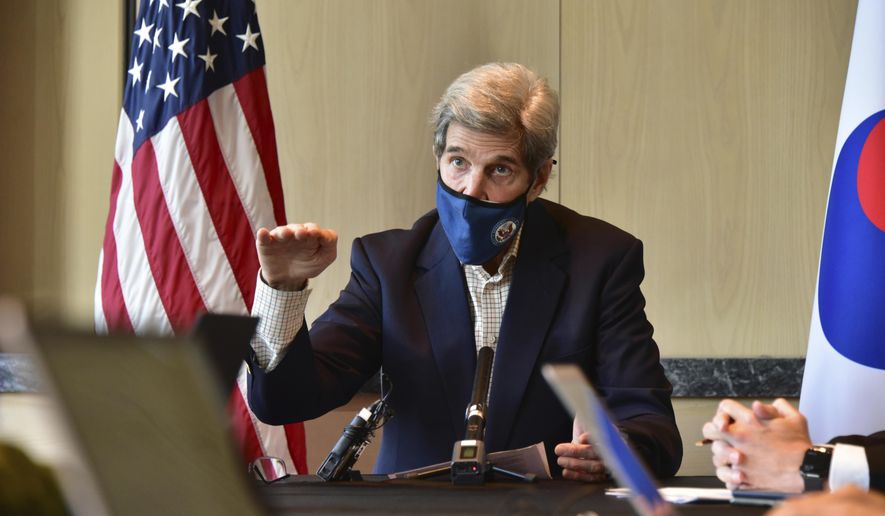Congressional Republicans are accusing former Secretary of State John Kerry, the White House’s special envoy for climate, of coercing financial institutions into discriminating against fossil fuel companies.
Twelve Republicans on the Senate Banking Committee, led by ranking member Pat Toomey of Pennsylvania, sent a letter to the Biden White House on Wednesday raising concerns that Mr. Kerry is “pressuring banks to make extralegal commitments.”
A similar letter was sent to Mr. Kerry by 45 House Republicans organized by Rep. Andy Barr of Kentucky. In their letter, the lawmakers explicitly accused the former secretary of state of “politicizing access to capital” by urging banks to curtail loans to the oil and natural gas industries.
“Putting your thumb on the scale in an attempt to force a transition away from fossil energy that is not supported by the market trends, guided by purely political motives, has the potential to destabilize U.S. energy security and raise prices for consumers,” the House Republicans wrote.
The letters come as Mr. Kerry has embraced his new role as President Biden’s international climate czar. Most notably, the former secretary of state has been traveling the globe, urging governments and the private sector to abandon fossil fuels.
As part of that effort, Mr. Kerry has specifically targeted financial institutions to mobilize investment and loans for green energy projects and technologies.
“I am in discussions right now with a number of our largest asset managers and major banking institutions with hopes that we can begin to understand where the capital could come from and how it can go to these sectors,” Mr. Kerry said last month.
Lawmakers, however, say he has gone further than simply urging investment in a particular field. They say Mr. Kerry in both private and public discussions has used the threat of increased federal regulation to stop banks from investing in fossil fuels.
Republicans point to recent comments Mr. Kerry has made at the International Monetary Fund and other venues as proof of political meddling.
At the IMF, he told financial leaders the White House was considering an executive order requiring companies to disclose their climate risks. Likewise, Mr. Kerry has warned banking and oil executives to not “wind up on the wrong side” of climate change, while regulation was looming.
“You don’t want to be sitting there with a lot of stranded assets,” Mr. Kerry said in a recent speech. “You’re gonna wind up on the wrong side of this battle.”
Such statements, Republicans argue, are meant to pressure banks to “cut off financing for fossil energy or otherwise limit their ability to extend credit to American energy producers or traditional utilities.”
Mr. Toomey, who served as a banker on Wall Street before being elected to Congress, argues such conduct is a “wholly inappropriate use of financial regulation and an attempt to substitute political favoritism for private business judgment.”
“The real objective here is to punish politically disfavored industries,” the senator said. “By straying beyond their mandates into the climate arena, financial regulators will pressure banks not to serve politically disfavored industries such as fossil fuel companies.”
The White House did not respond to requests for comment.
Apart from calling out possible political meddling, a source familiar with the Senate Banking Committee said lawmakers were also motivated by a desire to send “a message” to big financial institutions.
“Stop your own leftward political shift and end discrimination against otherwise solvent fossil energy companies,” the source said.
It is not clear if the message will break through, especially as the Biden administration is expanding its efforts to tackle the financial components of climate change.
This week, Treasury Secretary Janet Yellen announced the creation of a special “climate hub” within her department to hasten the nation’s economy away from fossil fuels.
“Finance and financial incentives will play a crucial role in addressing the climate crisis at home and abroad and in providing capital for opportunities to transform the economy,” Ms. Yellen said.
• Haris Alic can be reached at halic@washingtontimes.com.




Please read our comment policy before commenting.